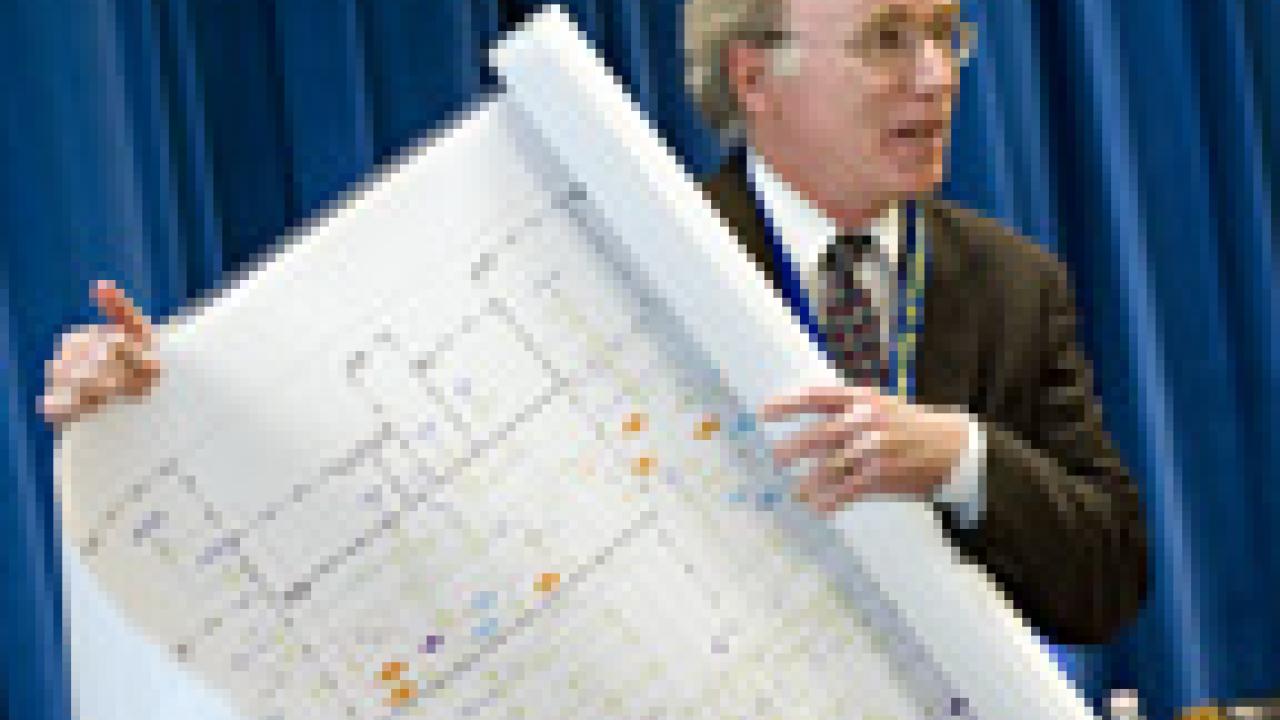SACRAMENTO — We are ideas. We are solutions. We are the University of California.
We are people like Dean Nicole Biggart of the Graduate School of Management and Professor Jay Lund of the Department of Civil and Environmental Engineering.
UC President Mark G. Yudof brought in Biggart and Lund for a forum as part of UC Day at the Capitol on March 10 — with the forum exemplifying the kind of work that Yudof says is critical to enhancing the quality of life in California and to bringing recovery from the global economic meltdown.
‘Make this state strong’
Yet California’s higher education model, unparalleled for its success and emulated across the nation and around the world, “is withering on the vine in the state of its creation,” Yudof told some 300 of UC’s strongest allies when they gathered for lunch on UC Day.
He was addressing delegates from around the 10-campus system — students, alumni, faculty, staff and others who had come to Sacramento for the UC system’s annual day of meetings with legislators and legislative aides, to build and maintain support for the university.
This year’s event came just weeks after the governor and Legislature approved a budget plan that effectively shorts the UC system some $450 million over two years.
Yudof decried California’s “declining investment in human capital” — the people of UC who are well suited “to make this state strong.” Later, at the forum, titled "Today's Ideas, Toimorrow's Solutions," Biggart and Lund and two professors from Berkeley helped prove his point.
They talked about their research, of course, but, like Yudof, they also spoke of UC’s human capital — and students in particular.
Lund, a professor of civil and environmental engineering, unrolled an 8-foot-long diagram to give a sense of the enormity of California’s water challenge, and how difficult it is to manage.
“This is the only schematic of the state water system,” he said, “and it came from UC Davis.”
The diagram is put to good use in addressing the state’s complex water challenges, in the public sector and in the consulting business.
“Our students are employed in all those agencies, or for those consultants,” Lund said. “They are the best part of UC.”
UC transforms economy
Similarly, Dean Biggart said: “We spread knowledge and people throughout the world.”
Biggart, who holds the Jerome J. and Elsie Suran Chair in Technology Management, said the UC system “refreshes” the work force with some 40,000 new alumni every year.
“An investment in us is an investment in jobs in a very powerful and big way,” she said. “We transform the economy … with new industries and new technologies, with more efficient and better ways of doing things.”
James A. Wilcox of UC Berkeley’s Haas School of Business said he and his colleagues are trying to devise a way to “refloat” some of the nation’s thousands of “underwater” mortgages — meaning the holders owe more than their homes are worth.
President Obama is offering mortgage assistance, but not for upside-down loans — 2 million of them in California, Wilcox said.
Perhaps, the professor said, banks would consider restructuring these loans in return for part-ownership in the properties — to be collected upon their sale. Thus, people could stay in their homes, with new payments based on the homes’ deflated values, and banks would save the high cost of foreclosures.
Wilcox also talked about undoing “securitization” — the process by which mortgages are split and sold to investors. Before such loans can be modified, “someone has to buy up all the pieces and put them together again.”
Aran Majumdar, a UC Berkeley engineering professor and director of the Environmental Energy Technologies Division at the Lawrence Berkeley National Laboratory, emphasized energy efficiency as being as important as renewable energy.
In fact, he said, “the energy efficiency part may end up paying for the renewable part.”
Yet few people know how much energy they use, and without knowing where they are starting, they cannot gauge their efficiency, Majumdar said. The solution, he said, is as simple as data collection and display — the “Prius effect,” referring to the hybrid car’s dashboard monitor that tells whether the car is running on its battery or gasoline, and how many miles per gallon the car is getting.
He also spoke of the need for a speedup in the development of more efficient batteries. Otherwise, he said, the United States “may go from importing oil to importing batteries.”
California, he said, already is a leader in energy conservation, with per capita consumption holding flat at about 7,500 kilowatt-hours annually since the oil crisis of the 1970s.
“We did this with innovation and technology,” Majumdar said. “We need to start innovating in California — again.”
In informal conversation, after the forum, Majumdar gave an example of such innovation: A climate control system that adjusts to your individual preferences wherever you go in a building, simply by reading data that you have stored in your cell phone.
The professors presented their forum before some 100 people in Gov. Schwarzenegger’s council room. The governor did not attend, though Yudof said he hopes the forum’s message filters back, not only to Schwarzenegger but also to legislators.
Earlier, in his luncheon address, Yudof told how he would spread the message ever farther if he had $10 million to buy a Super Bowl commercial. It would extol UC, of course, and other public universities.
He envisioned the ad showing someone starting their day with a bowl of strawberries, developed by UC Davis, or a ruby red grapefruit from Texas A&M. He or she would be alive only because of a pacemaker, using technology from a public university. When driving, this person would use a retractable seat belt, another invention from a public university.
Then, at the end of the day, our subject “would drink to UC Davis with a glass of red wine.”
Media Resources
Clifton B. Parker, Dateline, (530) 752-1932, cparker@ucdavis.edu
